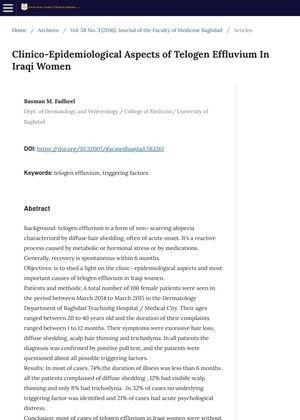Clinico-Epidemiological Aspects of Telogen Effluvium in Iraqi Women
October 2016
in “
Mağallaẗ Kulliyyaẗ al-ṭibb Baġdād
”

TLDR Most Iraqi women with telogen effluvium had no clear cause for their hair loss, and few had significant thinning.
The study "Clinico-Epidemiological Aspects of Telogen Effluvium In Iraqi Women" conducted by Basman M. Fadheel from March 2014 to March 2015 involved 100 female patients aged 20 to 40 years old who were experiencing symptoms of telogen effluvium, a form of non-scarring alopecia. The symptoms included excessive hair loss, diffuse shedding, scalp hair thinning, and trichodynia. The study found that in 74% of cases, the duration of the illness was less than 6 months. All patients reported diffuse shedding, 12% had visible scalp thinning, and only 8% had trichodynia. In 32% of cases, no underlying triggering factor was identified, while 21% of cases were linked to acute psychological distress. The study concluded that most cases of telogen effluvium in Iraqi women did not have a clear underlying triggering factor. Despite anxiety about impending baldness, significant hair thinning was present in only a minority of patients. The study also highlighted the importance of checking for underlying iron deficiency, as 6% of patients showed evidence of subclinical iron deficiency on laboratory examinations.






